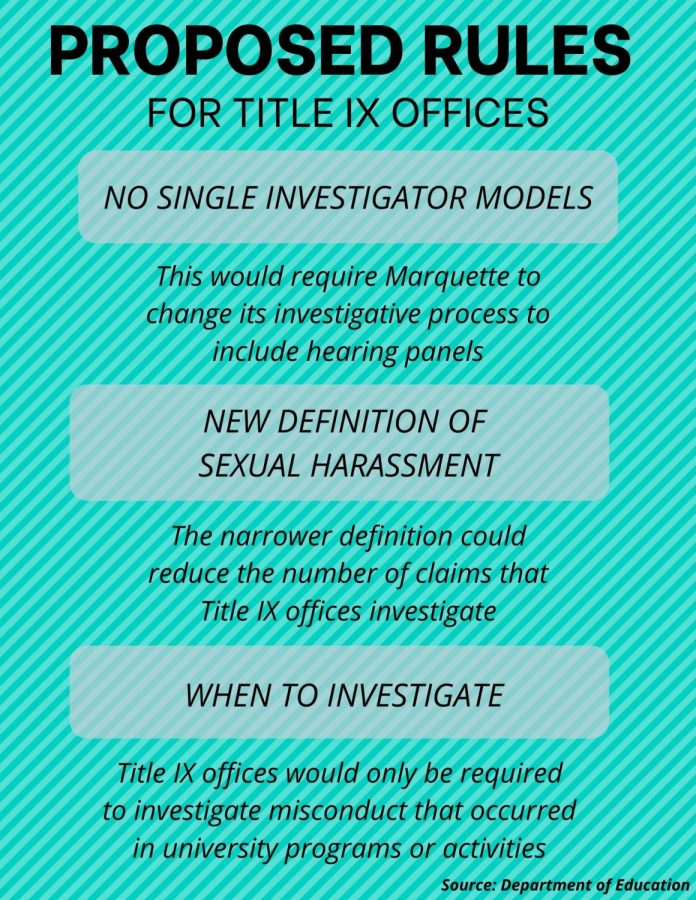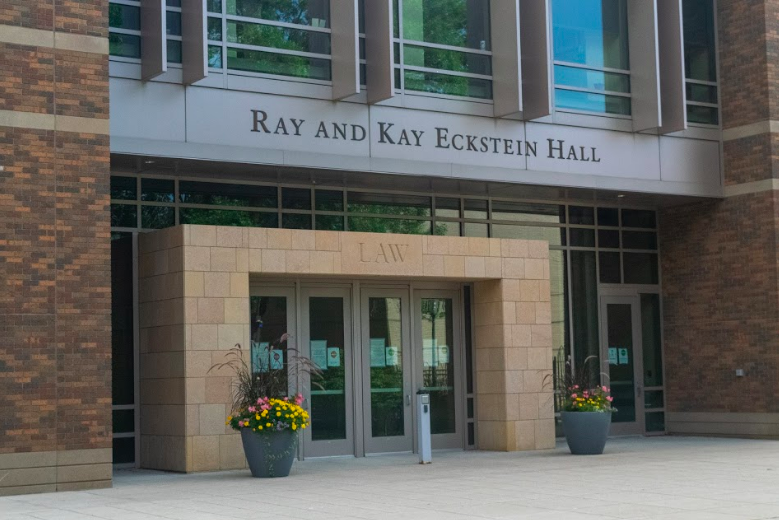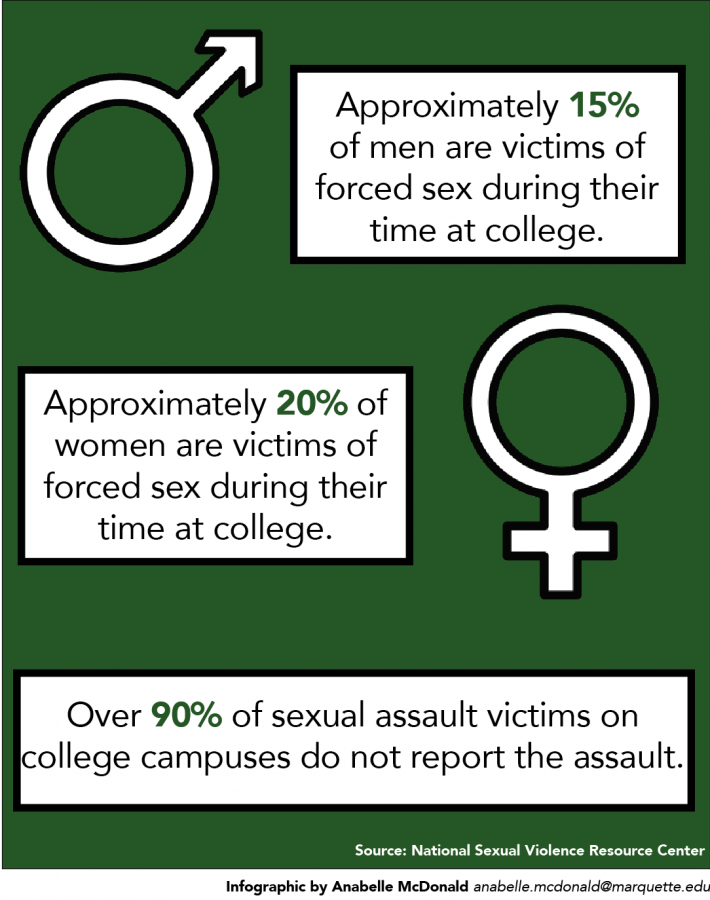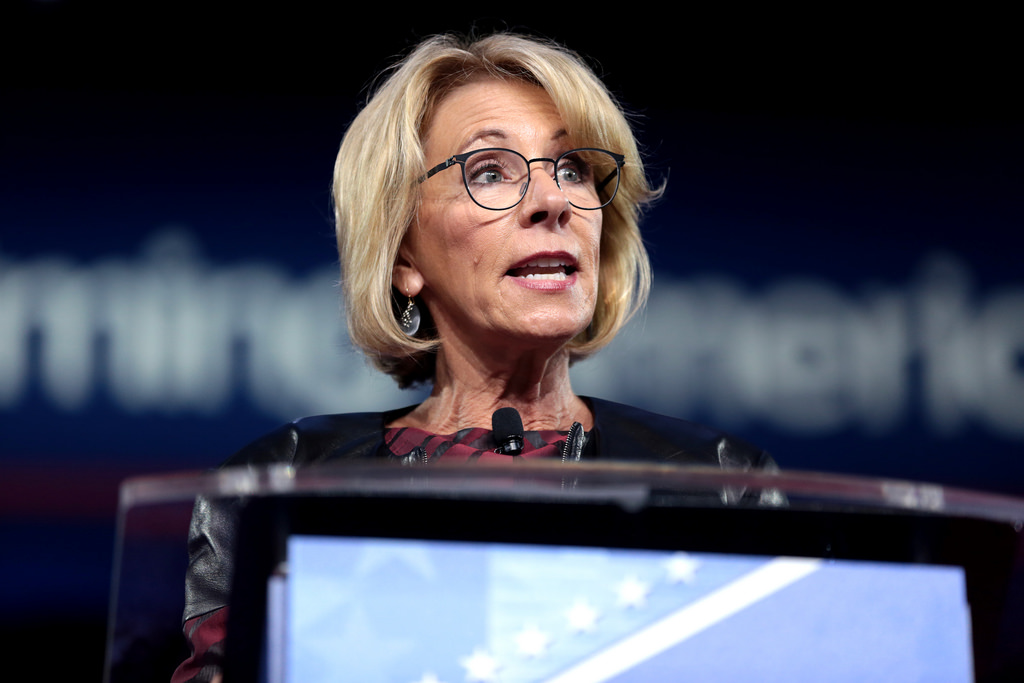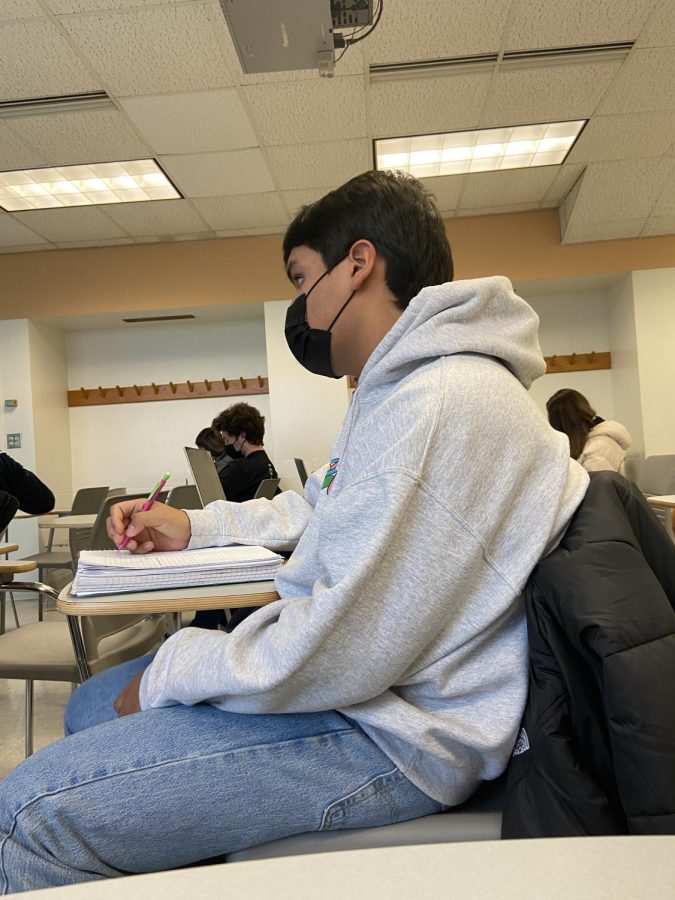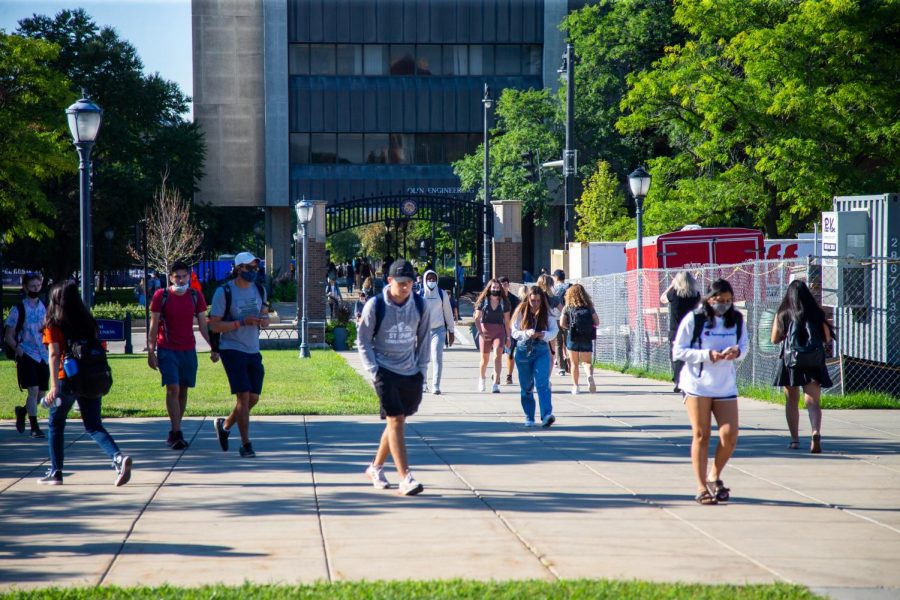Working from home, Marquette Title IX Coordinator Kristen Kreple interviews students through a computer screen for ongoing sexual misconduct investigations.
The Title IX office’s operations moved off site after the university announced March 12 that classes would move online. Relying on video platform Microsoft Teams for most meetings, Kreple said she sometimes calls students on nights and weekends, working to ensure that students have internet access and safe spaces to speak with her while at home.
“Because this is such an unprecedented time, we are finding creative ways to make everything work,” Kreple said.
It’s a reality brought on by the spread of COVID-19, which prompted Marquette and other universities to suspend on-campus classes and events. Title IX offices at these universities transitioned to remote services without much guidance from the U.S. Department of Education, an agency tasked with Title IX oversight.
Title IX is a statute in the Education Amendments of 1972 that prohibits sex-based discrimination, such as sexual assault or harassment. Universities that receive federal funding are required to abide by Title IX.
The lack of a recommended approach by the Department of Education gives Title IX officials discretion to transition their services in the way they see fit, leading to possible inconsistencies across universities. This is during a time when universities are anticipating new federal rules on Title IX from the Department of Education.
“One of the challenges of Title IX is that you have this very short law … the more guidance, recommendations, best practices that we have from the entity that is in charge of enforcing it, the better,” said Kate Lawson, Xavier University’s chief Title IX officer.
Lawson said the Department of Education gave no indication to universities that Title IX offices are permitted to delay their responses or duties. The expectation remains from the department’s Office for Civil Rights that investigations should happen in a timely manner.
A spokesperson at the Department of Education said it could not provide prompt responses to questions from the Marquette Wire, adding that it is “swamped with requests” for information.
Title IX offices are simultaneously grappling with unique issues prompted by COVID-19, such as potential increases in online harassment and intimate partner violence. Kreple said she anticipates shifts in the nature of Title IX cases reported to the office, though changes haven’t happened yet.
“Perhaps there could be more online harassment or there could be a situation where someone is in a living situation with someone who might be engaging in relationship abuse,” Kreple said. “That could be a difficult space for them to be in because they can’t escape in the same way that they might be able to otherwise.”
In the meantime, Kreple said the Title IX office continues to receive reports of incidents that happened before Marquette transitioned to remote learning. There is no limit on when students can report misconduct to the Title IX office, and it can take time for students to decide whether to file a complaint.
Searching for support
Without much federal guidance, Title IX offices are turning to their respective universities and professional organizations for support.
Kreple said Marquette’s Information Technology Services department is excelling in its assistance during the online semester. When she recently encountered a technology issue, she said ITS responded quickly.
“I’ve been so heartened by all the folks I work with,” she said.
At Xavier, Lawson similarly praised the university’s technical support and training services, though she acknowledged occasional Wi-Fi or other issues from the people she calls.
Kreple said she misses the in-person support of colleagues during chats between meetings.
“Title IX offices tend to be really close because a lot of the issues that we work on are hard, and because we can’t talk about them with anyone else, we really lean on each other for support,” Kreple said. “Not being able to do that in person is kind of tough, but hopefully this won’t last for too, too long.”
Marquette’s Title IX Office was not affected by university furloughs and did not receive any pay cuts, Kreple said. The office remains at its full capacity with one Title IX coordinator and four deputy Title IX coordinators, the latter of which assist the head coordinator.
Allison Taylor, the Title IX coordinator at Creighton University, said her office is taking advantage of webinars and information from the Association of Title IX Administrators. ATIXA is a professional association for school employees who wish to further their commitment to Title IX.
“Everything is so new that we’re all still learning what the concerns are with online learning and communication,” Taylor said in an email.
Lauren Hasselbacher, the Title IX coordinator at University of Wisconsin-Madison, said the director of the university’s Office of Compliance is doing staff check-ins. She said members of the office attended various training sessions and discussions to learn ways to effectively interview and conduct hearings remotely.
“We’re also trying to be aware that there might be benefits and tips that other schools can provide us who have maybe been doing this in other circumstances,” Hasselbacher said.
Timeline changes
The transition to remote operations is causing delays in some ongoing Title IX investigations.
Changing timelines can be due to differing schedules, time zones, virtual classes and assignments while students are mostly off campus, Taylor said.
“I think as we adjusted to working from home and our new schedules, I’m sure that — without being able to calculate it exactly — it would be reasonable that that would maybe cause some delay,” Hasselbacher said.
Despite this, Hasselbacher said she knows her office should address allegations “as quickly as reasonable.”
At Marquette, Kreple said there are no delays.
“Because people’s availability might be different than it would normally if they were on campus, that could maybe slow things down, but I haven’t seen any of that yet,” Kreple said.
She said Marquette’s Title IX office has prior experience working remotely. Whether working with students studying abroad or during academic breaks, Kreple said Marquette Title IX employees “already have a good process in place for doing a lot of investigating online.”
“We’ve been doing that for a long time, and so that’s a very comfortable space for us,” Kreple said. “That piece of it was a pretty easy transition.”
For now, Lawson is allowing students who report misconduct to choose communication mediums they prefer, whether phone calls, email, videoconferencing or something else.
She calls it putting them in “the driver’s seat.”
“The truth is that, for one person, proceeding remotely through the complaint resolution process will feel like the right decision, and for others, it won’t,” Lawson said.
Lawson said she does not compel reporting students to participate in any process that makes them uncomfortable, including remote investigations. She said she has not yet received requests from students to pause or stop virtual proceedings. If they wish, students could wait to continue their investigations in person.
Awaiting new federal guidelines
While Title IX offices adjust to remote work, they are awaiting the release of new federal regulations outlining changes to the investigative process.
“I think the department has been focused on those instead of giving more short-term guidance,” Kreple said of the proposed rule’s consideration during COVID-19.
The drafted rule is championed by the U.S. Secretary of Education Betsy DeVos, whose department released it in November 2018. The news release announcing the proposed rule said it “ensures that due process protections are in place for all students.” Critics of the rule argue it may deter students from reporting misconduct and that it could further traumatize victims.
“The proposals were published about a year and a half ago now, and we’ve kind of been in limbo waiting to see when those final rules will be published,” Hasselbacher said.
The new regulations would mandate that universities hold live hearings with cross-examination of reporting and accused parties, and it would prohibit universities like Marquette from using single-investigator models for Title IX proceedings.
Marquette’s single-investigator model involves a Title IX deputy coordinator or head coordinator handling a case from start to finish. The investigator interviews the reporting party, accused party and witnesses, eventually drafting an investigative report that is sent to the Title IX coordinator for approval. The report includes findings and any sanctions to be issued, such as probation, suspension or expulsion.
The same sanctions as normal are being used in remote investigations, Kreple said. The Title IX coordinator sends a final notification to parties involved, according to Marquette’s policy.
The single-investigator model contrasts with a hearing model, in which several panelists interview parties, review materials and issue decisions. The hearing model requires more people involved in most meetings with reporting parties, responding parties and witnesses. This would require additional coordination by Title IX employees to schedule virtual proceedings.
If the final rule is published, Marquette would need to revise its policy and procedures to institute a hearing process. Kreple said her previous role as the Title IX & Equity investigator at Stanford University gave her experience in the hearing process.
“Moving to a hearing process will be a big change for us,” Kreple said. “It’s definitely going to take some work to get it into place.”
Kreple said Marquette’s Title IX office is working on changes to its policy if drafted guidelines are published in the coming weeks.
“Nothing is final, but we’re working with a lot of folks on campus to make sure that we do what works best for Marquette’s culture,” Kreple said.
Among other provisions, the proposed rule requires that universities investigate alleged harassment that takes place in a university’s own program or activity. This does not include misconduct that happens in off-campus housing or businesses, such as bars or restaurants in the area.
The current guidelines require universities to investigate any misconduct between students that affects learning experiences, regardless of whether it occurs during a campus program or activity.
The Department of Education stated the proposed rule does not mean off-campus misconduct is automatically excluded from Title IX investigations. If university programs happen off campus, for example, Title IX officials should investigate alleged incidents.
Marquette’s current Title IX policy makes clear that the office will investigate reported misconduct, whether on or off campus.
The proposed rule would define sexual harassment as “unwelcome conduct on the basis of sex that is so severe, pervasive, and objectively offensive that it effectively denies a person equal access to the school’s education program or activity.” The current definition is broader, encompassing any unwelcome conduct of a sexual nature. The change could reduce the number of claims that Title IX offices constitute as sexual harassment.
Another aspect of the drafted rule involves proof in Title IX cases. Investigators must meet the level of proof outlined in their university’s Title IX policy to show that someone violated the policy. Marquette uses a standard called preponderance of the evidence, which requires investigators who give sanctions to prove that a violation of Title IX policy was more likely than not. The drafted rule requires universities to use either the preponderance of the evidence standard or the clear and convincing evidence standard, the latter of which requires a higher level of proof.
Marquette could continue its current evidence standard as long as it uses the standard for other conduct code violations, ones that do not involve sexual harassment but share identical maximum disciplinary sanctions.
Hasselbacher said it would be “really difficult” if the Department of Education publishes the final rule during remote operations.
“I know there has been significant pushback across the country on the timing if those are released,” Lawson said of the guidelines.
The new rule would cause Hasselbacher to meet with key campus stakeholders for revisions to the Title IX policy. Not only that, but UW-Madison’s student disciplinary process is outlined in the state code, requiring approval of the legislature to make changes.
“There’s a lot of coordination that’s going to be required to be in compliance with whatever those final rules are, but it’s just going to be quite difficult to accomplish while we’re all working remotely,” Hasselbacher said.
Attorneys general from 17 states and Washington, D.C. — not including Wisconsin — wrote a March 27 letter to DeVos and other leaders. The letter urges the Department of Education and the Office of Management and Budget to suspend the rule-making process until normal university operations return.
“The changes outlined in the proposed rule would take a great deal of an institution’s time, resources, and effort in the best of circumstances,” the letter reads. “But in the midst of a national health emergency, the burden placed on schools would be untenable and ultimately counterproductive to student safety.”
The OMB calendar shows that the governmental office held various meetings in March to discuss the rule, but some of the meetings are labeled “no show,” meaning they did not happen as planned. There are currently no future meetings scheduled for the proposed guidelines.
This story was written by Sydney Czyzon. She can be reached at sydney.czyzon@marquette.edu or on Twitter @SydneyCzyzon.
NOTE: Georgetown University did not respond to repeated requests for interviews from the Marquette Wire. Fordham University Title IX Coordinator Kareem Peat said it is “not the practice of the Title IX Office to participate in this type of interview.” Saint Louis University Title IX Coordinator Anna Kratky did not call for a requested interview. Santa Clara University and Loyola University Chicago provided general statements about continuing operations.

